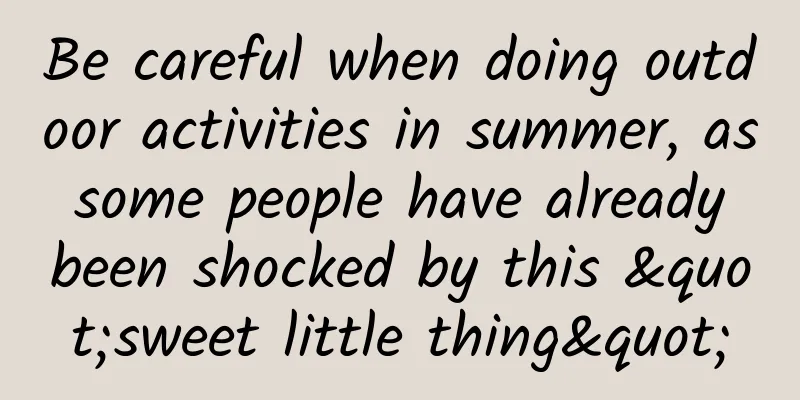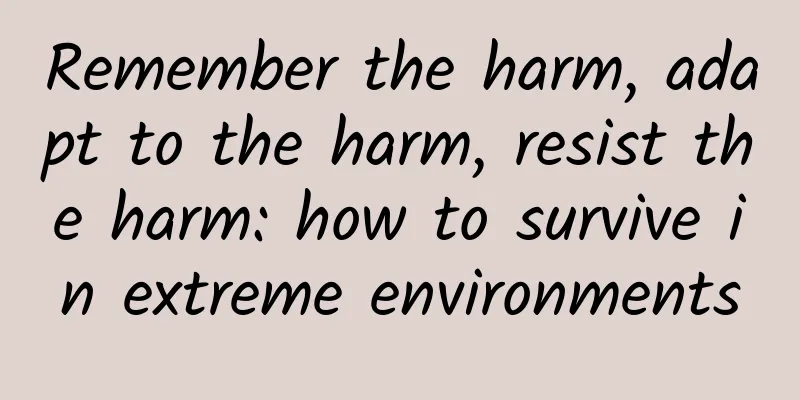Be careful when doing outdoor activities in summer, as some people have already been shocked by this "sweet little thing"

|
"Buzz, buzz, buzz..." When you are enjoying the flowers, be careful of this sound. Mr. Meng, 50 years old, was working in the wild when he went into shock because of this "sweet little thing" and was sent to Zhejiang Provincial Tongde Hospital for emergency treatment. After the emergency doctors carried out professional rescue, his life was finally saved. Doctors remind that if you encounter a swarm of bees, you should avoid it as soon as possible, and if you are stung, you should seek medical treatment in time, and never delay. 50-year-old flower farmer stung by bee He lost consciousness within a few minutes. "Ding wu ding wu ding wu..." At 8 o'clock in the morning, during the morning rush hour in the city, the ambulance brought in a patient, Mr. Meng, who was in shock. When Dr. Tian Siqi from the Department of Emergency Medicine saw the patient, he found that he was pale, his eyes were closed, his lips were swollen, his blood pressure could not be measured, and he was sweating all over his body with large areas of scattered red spots. When the doctor quickly asked about the patient's condition, he learned from the colleague who accompanied Mr. Meng that Mr. Meng was a flower farmer in a park in the west of the city. He was stung by a bee while watering the flowers and lost consciousness in a few minutes. The emergency medical team quickly started treatment: oxygen inhalation, monitoring, intramuscular injection of epinephrine, establishment of intravenous access, rapid fluid replacement, anti-allergic and anti-shock treatment, etc. After active treatment, Mr. Meng's blood pressure quickly returned to the target value, and oxygen saturation also reached normal values. Then his consciousness began to clear and he slowly opened his eyes. After 6 hours of active treatment, Mr. Meng's vital signs have stabilized, the rash on his body has basically subsided, and the swelling of his lips has also improved significantly. Mr. Meng and his family expressed their deep gratitude to the medical staff of the emergency medicine department for their active rescue. Dangers of bee stings According to Yang Zheng, director of the Emergency Trauma Center of Zhejiang Provincial Tongde Hospital: Mr. Meng's condition was serious, but he was lucky because he was not found in the wilderness and did not have any serious organ damage. He recovered and was discharged from the hospital soon. But not everyone is so lucky. According to some European and American surveys, the mortality rate related to bee stings is about 0.3/100,000 to 4.8/100,000 per year. Bee stings can cause systemic allergic reactions, such as systemic rash, itching, and shock. Local reactions may include redness, swelling, and pain in the wound, central suppuration, and necrosis. Stings to the airway or eyeball may cause airway stenosis, secondary glaucoma, and even eye atrophy. Systemic organ damage includes damage to the nervous system, respiratory system, circulatory system, digestive system, blood system, and urinary system. Mild cases may cause headache, delirium, shortness of breath, palpitations, chest tightness, nausea and vomiting, subcutaneous hemorrhages, tea-colored urine, etc. Severe cases may even cause cerebral hemorrhage, respiratory failure, cardiac arrest, gastrointestinal bleeding, leukemoid reactions, and even induce DIC. Multiple organ dysfunction syndrome is also not uncommon, so it is very important to master the early treatment methods of bee stings. What should we do after being stung? Stings are caused by the injection of venom into the human body or the stinger remaining in the skin after being stung by the bee's tail. Minor stings can cause local skin allergy symptoms such as redness, swelling, pain, itching and poisoning. Severe stings can lead to anaphylactic shock, coma, etc. If rescue is not timely, it can even lead to death. Common bee stings are mainly honey bees and wasps (also known as hornets). There are three principles for early treatment of bee stings: one, pull out the sting, two, wash, and three, seek medical attention. Pulling out: It is not recommended to squeeze with your hands or pinch directly with tweezers. It is recommended to use a flat object such as a bank card or fingernail to scrape out the thorn to reduce the remaining toxins being squeezed into the skin. Second wash: Bee venom contains enzymes, peptides, amines, and amino acids. Its venom is acidic, so it needs to be washed with soapy water or 2-3% sodium bicarbonate water. There are many types of wasps, and their toxins are also diverse, including biogenic amines, neurotoxins, kinins, etc. Most wasp toxins are alkaline, so acidic detergents such as edible vinegar are recommended for washing. If you can't tell the bee species or don't have any items, then rinse with plenty of clean water. 3. Seek medical attention: If you need to see a doctor after the initial treatment, but if you have antihistamines such as cetirizine or loratadine, you can also choose to take oral medications before seeking medical attention, which can relatively relieve the symptoms. How should we take protective measures? 1. Beekeepers should take adequate protective measures when working. 2. Ordinary people should also wear appropriate clothes when working or playing outdoors (do not wear brightly colored clothes, do not wear clothes that are too revealing, you can wear some clothes for outdoor activities, wear a hat, and gloves). 3. Educate children not to chase bees, let alone stimulate beehives. If you encounter a bee swarm, you should avoid it as soon as possible and do not actively slap or drive it away. 4. Summer and autumn are the seasons when hornets are most active. They are mostly distributed in areas with lush wild vegetation. When you go out to play in the suburbs or work in the wild, you should wear long-sleeved clothes. 5. Once a swarm of bees is attracted, protective measures must be taken immediately, such as hiding inside a building and closing doors and windows, lying down on the ground to reduce the exposed area, covering the body with clothing or other membranes, especially protecting the face, hands and other exposed parts. 6. If you are stung by a bee, check for stingers in your skin. If you find any stingers, remove them and rinse the wound with clean water. Non-professionals should not touch the beehive. Metropolis Express·Chengshi Interactive reporter Zhang Jing correspondent Ying Xiaoyan Tian Siqi |
<<: Do cats really care about you? Now we have a conclusion
>>: Swimming in summer, beware of "hidden drowning"
Recommend
Can we create intelligence by imitating a brain?
The brain is not a computing device, nor is it a ...
Why Arm's ban on Huawei will not have any substantial effect?
Huawei can rely on its existing ARMv8 licenses fo...
How did Smartisan and JD.com use Weibo to promote and boost sales of their new products?
On May 9, 2017, Luo Yonghao held the " Smart...
The outlook for Android is not optimistic. The deployment rate of the new version has dropped by 20%.
According to foreign media reports, compared with...
4 new media writing suggestions that you may need!
The popularity of WeChat has also brought about a...
Orange cats are fat and silly? This may be because there are more male orange cats
When it comes to orange cats, the keywords that c...
The first flight was a success! Hybrid power, unmanned operation... What are the strengths of the first "hybrid version" of the Long March rocket?
Image source: Xinhua News Agency After much antic...
Li Xiaoguang's "2021 Stock Market Review" video lecture series on market trends
Li Xiaoguang's "2021 Stock Market Review...
5 major trends in brand marketing in 2021
Among the top ten popular slogans, Yuanfudao (A t...
Walking like a penguin? Be careful of these 5 walking postures, there may be something wrong with your body!
Everyone's walking posture is different. Some...
Is it illegal for Douyin to attract traffic at a low price? What are the penalties?
Although Douyin has a large number of users and t...
Technology Morning News丨my country's COVID-19 vaccine has been fully vaccinated with more than 1.2 billion people
【Today’s cover】 Recently, the 23rd Harbin Ice and...
How much does it cost to create Sogou Encyclopedia? Are there any discounts?
Everyone knows that Sogou Encyclopedia is a platf...
Meizu vs Xiaomi smart ecosystem: fierce debate in 2015
[[127133]] As the mobile phone industry enters a ...









